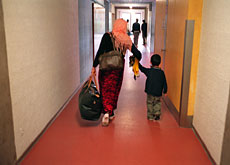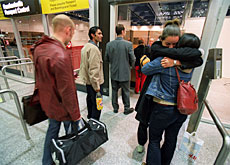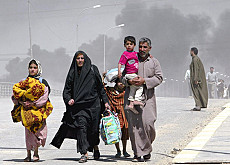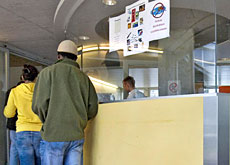NGO slams application of new asylum laws

The Swiss authorities are too strict in their application of recently introduced tougher asylum laws, says a non-governmental organisation.
The Swiss Refugee Council (SRC) criticised on Thursday the Federal Migration Office for setting the bar too high when considering applications from asylum seekers, in particular over the kinds of identity documents required.
Under the asylum law that came into effect in January, those people who fail to produce a valid identity card or passport within 48 hours are fast-tracked and rejected. The cabinet promised last year that exceptions would be made in credible cases to prevent “true refugees” being turned down.
“The government hasn’t kept its promise,” said Jürg Schertenleib, head of the SRC’s legal services, presenting an overview of the first six months under the new laws.
The SRC has examined around 1,000 cases where asylum requests were rejected and has found numerous problems over the interpretation of the new laws.
During the first five months of 2007, compared with the same period in 2005, the percentage of rejected cases rose from 3.3 per cent to 12 per cent. More than half (55.9 per cent) of these requests were due to missing documents, compared with 9.9 per cent in 2005.
Requests were turned down even if the identity was established or considered highly likely via a document such as a driving licence or birth certificate, the refugee organisation said. It added that the option of extending the 48-hour delay to secure missing documents was rarely used.
The SRC added that the Federal Migration Office also rejected outright any excuses for the missing paperwork, arguing that many applicants often made them. Cases were turned down even when people had been victims of rape or genital mutilation or had fled a war zone.
According to SRC spokesman Yann Golay, the migration office seemed to have taken “the easy way out”.
Rejection of criticism
The Federal Migration Office, which draws a positive picture of the past six months, rejected the interpretation of these figures.
“Since January the migration office has turned down some 700 applications from asylum seekers due to missing documents, but in more than 1,000 other cases where the documents were also lacking their requests were considered,” said Dominique Boillat, the migration office spokesperson.
The office defended itself against accusations that it had overstepped the line set out by parliament.
It argued that every application was looked at carefully with the respective refugee organisations to see if there were acceptable reasons for missing documents or signs of persecution.
Demands
The SRC has set out a series of demands for the government to improve the situation.
“If there is no obvious reason to reject an asylum request, it should be examined in detail,” it declared.
Asylum seekers should also be guaranteed access to consultations and legal representatives. And there needs to be flexibility over the reasons that justify the lack of certain documents, the SRC said.
The migration office, however, dismissed any need to change things.
“The Swiss procedure for rejecting asylum applications corresponds more or less to the fast-track procedure in other European countries,” said Boillat.
swissinfo with agencies
There were 10,537 asylum applications in Switzerland in 2006, compared with an average of 25,860 over the past ten years and a peak of 48,057 in 1999.
According to the Federal Migration Office, approximately 10% of asylum seekers are recognised as refugees.
There were 8,859 official departures by asylum seekers from Switzerland in 2006, compared with an average of 21,819 over the past ten years and a peak of 48,974 in 2000.
Since 1997 some 65,000 people from 21 countries have benefited from repatriation assistance from Switzerland. Last year some 1,535 people received assistance.
In September 2006 two-thirds of voters backed new laws on immigration and asylum, which the government said were necessary to make Switzerland less attractive and to curb abuses. It was the ninth time since 1984 that Switzerland’s asylum law had been amended.
Under the new asylum law, those who failed to produce valid travel and identification documents within 48 hours would be rejected.
Asylum seekers who refused to leave the country could be detained for up to two years pending deportation. Minors could also be detained for up to one year.
They would also lose the right to social security benefits and could only receive emergency aid of SFr960 ($800) a month.

In compliance with the JTI standards
More: SWI swissinfo.ch certified by the Journalism Trust Initiative



You can find an overview of ongoing debates with our journalists here. Please join us!
If you want to start a conversation about a topic raised in this article or want to report factual errors, email us at english@swissinfo.ch.